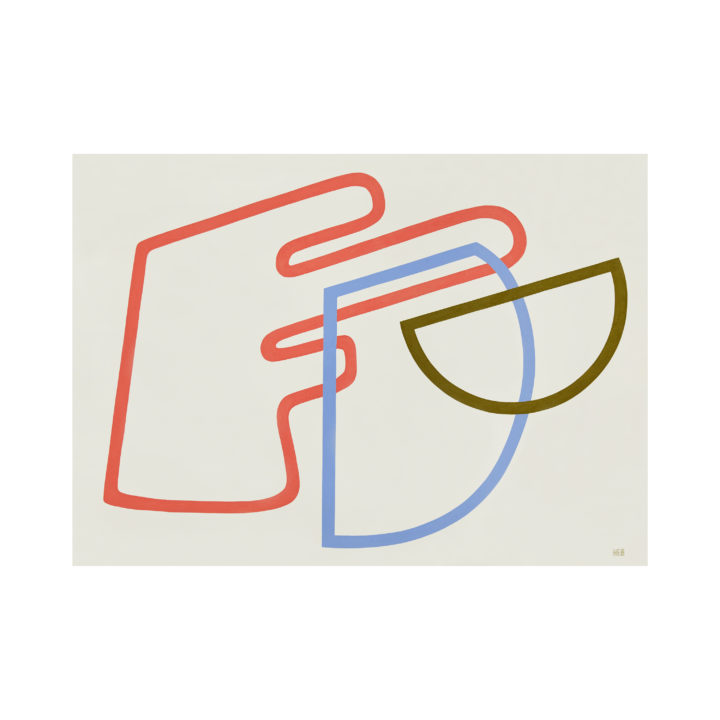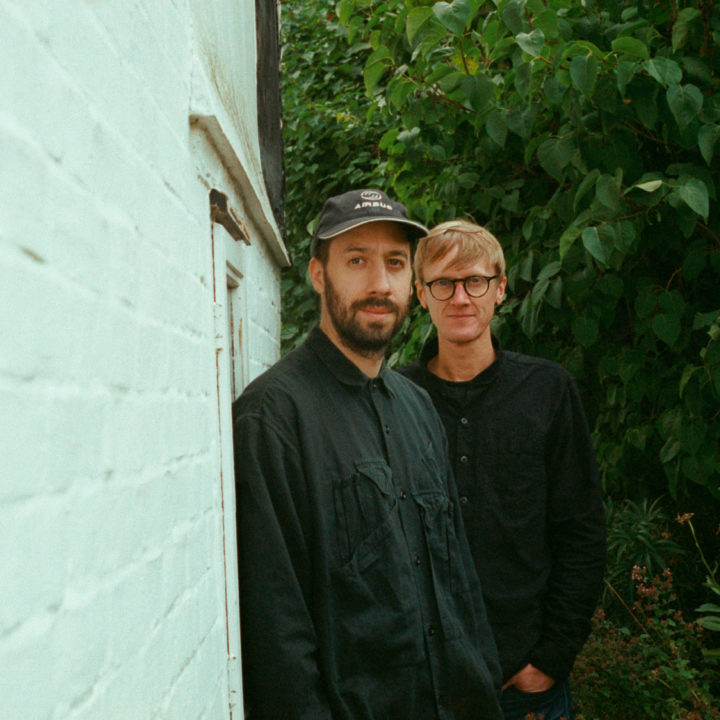Selling
Biography
Selling: On Reflection.
It’s easy to eye collaborative records between two established artists with either a weary sigh or a degree of cynicism. In an age where a track or record seems to perform better directly in relation to how many artist names are on the digital byline, it can often feel like engineered circumstance or a desire to exponentially boost appeal comes before any natural create endeavour. In the case of ‘On Reflection’ however – the new record by Derwin Dicker AKA Gold Panda and Jas Shaw, one half of Simian Mobile Disco, the venture, under the moniker Selling is rooted in a long-standing friendship and prior creative history.
Having first met a decade ago, the two have prior history together: Jas has mixed two Gold Panda records, including the breakthrough debut ‘Lucky Shiner’. In between, Gold Panda and SMD played shows together in the UK, US and Japan. So further collaboration was a natural progression, but as Derwin notes, not an inevitable one: “We talked about ‘we should just get together and make some tunes some day’. But you always say that with people and it never happens”, he notes, wryly.
Happily though, the truism was dispelled and they did eventually find themselves at Jas’ studio in Kent for a series of recording sessions last year. For Jas, the appeal was two-fold. “Selling was made for fun, really as an excuse to get Derwin to come to my house and drink tea. I like to think that enjoyment is audible in the record”, he notes. Additionally, Jas was drawn into working with someone who could offer a different way of creating in the studio, given he already has a successful and enjoyable partnership with his lifelong Simian Mobile Disco partner James Ford. “I have always enjoyed how natural and unschooled Derwin’s approach to music is. I know that sounds like some sort of veiled insult but it’s not at all, electronic music is littered with well constructed, sensibly arranged tracks that follow a logical harmonic theme, almost all of that music can get fucked.”
From Derwin’s side, having a collaborator for the first time was appealing. “I’ve always been a solo artist, so it’s a lot. When you work on your own, you’re highly critical of what you make because it’s all yours, and there’s no one else to enjoy it with. It can feel like work very quickly.”
“It’s hard to know whether to pursue something – if something’s not working straight away, do you carry on or do you just quit? With someone else you can inspire the other person and say ‘let’s carry on with that’ or I might say ‘I think it’s shit’ and the other person will say ‘oh no, it’s good, I think it’s good’.”
Derwin concurs that the process making ‘On Reflection’ was relatively painless. “The first time I went to visit Jas, we just switched the gear on and made some tracks, and I thought ‘well that was easy, let’s do it again’.”
In terms of how they reached the magic Selling formula though, it wasn’t until they disposed of pre-defined ideas of what they were going to make, that they fell into a creative routine. “We started off making techno records,” Derwin admits. “We started off trying to make stuff which we were really both into - which is a lot of fast, hard techno - something I’d never made before. And it wasn’t till we got away from that template, that things came together.
‘On Reflection’ ultimately grew from a series of sounds and ideas that were quickly recorded and then edited down to their purest form. It’s a record that exists in spontaneity and quick, gut decisions rather than any sort of laboriously plotted selection of notes and sounds.
“Some of the early music we made was really long”, Derwin recalls, “the first track we created was 40 minutes long, then we made something that was twenty minutes.
It was during this process that Derwin discovered the true joys of collaboration: “What Jas is good at doing is going through that file and making that 10 minute file three minutes, finding the good bits.”
He pauses, then adds, “I look at the screen and go ‘I can’t be bothered’”
Expanding on the theme, Jas explains: “The bulk of the time for ‘On Reflection’ was editing. We would track a few things each day and then come back and choose the ones that we were most excited about and try to chop them down from 18 minutes to something that felt like a concise object. Lots of the tracks loop in strange ways, or are polyrhythmic but with all parts printed together, so editing could be a proper headache. There was some ‘God we should have printed these separately’ moments but it always resolved itself somehow.” Indeed, the chosen process threw up new, positive directions. “in a few cases it forced us to edit in places where we wouldn’t have chosen to”, admits Jas.
Derwin points to the track ‘Keeping Txme’ as the point where the two felt they had really nailed down the process. “ It was the 15th or 16th track we made [in this process] but it was the first track where we did it and it felt finished as soon as we were done. And then it was like, ‘this is good, let’s do more’. We got into a rhythm. We were getting closer to making concise five-minute tracks once we got good at it. And that’s when things began getting finished. We then went back to the earlier ones and found the things we liked in them.”
From there, tracks quickly emerged that both Derwin and Jas liked. ”I really like ‘No Reflection’,” Jas offers, “but this is probably coloured by my memory of recording it, I can still feel that moment where the fun, almost tropical pattern emerged from chaos. I love it when that happens. I also really like ‘Dicker’s Dream’, it’s a bit of an outlier on the record as it’s so long but this one in particular benefitted from Luke Abbot’s mixing, his mix was much more patient than mine, developing slowly and leaving room to still be introducing elements near the end.”
“It always changes, which is good”, muses Derwin. “When your favourite changes, that’s a good sign. It’s probably ‘No Reflection’ at the moment or ‘Moon In Water’, because it’s not as instant as the other ones and there are a lot of layers to it.” Like his Selling partner, he also flags up ‘Dicker’s Dream’, though for perhaps different, slightly more contrarian reasons: “it’s nearly nine minutes and it doesn’t have any stuff I’d have in a Gold Panda tune, which makes me like it.”
Made in Jas’ studio, which is a converted barn at his home in Kent, the record was made “in between eating sandwiches”, Jas confides. Put together at a leisurely pace, Derwin would visit a few days at a time and the two would split their time between making tunes, walking Jas’ two greyhounds and visiting a local farm shop each day. “They’ve got this farm shop called Macknades, and it’s incredible”, sighs Derwin wistfully. “We’d go there everyday and get fresh bread and cheese. A lot of cheese was eaten. Oh, and fudge.”
Touching on how the record was formed, Jas adds “The heart of the record is [Hardware sequencer] Cirklon, it’s such a brilliant sequencer. Unusually we didn’t use the pallet of Gold Panda, which is MPC-driven, or SMD, which is modular synth driven. We started most tracks out with quite cheap 90s rack-mount synths, the type that can be bought on ebay for 30 quid. Even though these are totally digital they really have a distinctive character to them, kind of grainy and shit but in a charming way. Obviously there was a bit of synth stuff, we were not adhering to any rules but I usually think that choosing a palette of sounds to start with gives you a good chance of getting a cohesive record.
“Jas’s studio is like a treasure trove, Derwin enthuses. “That makes it easy cos it’s all ready to go.
…we only had to fiddle around with wires for around half a day. “
Seemingly the two emerged from the record unscathed and enthused by their experience. Both enjoyed the adjustment of either working with a new partner in Jas’ case, or indeed an ally for the first time for Derwin, both enjoying the differences. “I imagine that having someone else in the room was odd for Derwin as he does Gold Panda stuff on his own, suggests Jas. “I’m used to having a studio buddy but James (Ford) and I have been close friends for 20 years so not having him there was odd. As I mentioned before, Derwin and I know each other well enough that we don’t tiptoe around each other and the system that we made was fun so making tracks was never a grind, it was always fun.“
“It’s the most immediate and natural record I’ve ever made,” concedes Derwin. “I never thought I would be a collaboration person, but I guess it’s finding the right person to make a record with.”
Did Jas compare you to ‘the other person’?
‘All the time’, replies Derwin laughing.
“I don’t want to fall into the trap where I feel like I should make a certain type of music, or should sound a certain type of way”, summarises Derwin. “I hope with Jas, he and I can carry on and keep making music and it’s fun. We didn’t make this for a label or something. Initially, it was just us mucking around. There was no plan to make an album. Originally I thought we were going to make a track here and there and stick them out on vinyl. But then, we had an album that sounded quite good and it was like ‘well if we have an album’s worth of stuff, maybe we should just release it’. It became a thing, I suppose.”
“But we’ll quit
Releases

Selling

